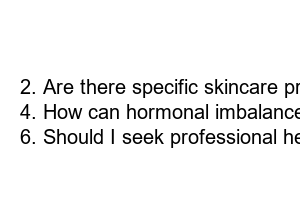다래끼 나는 이유
Do you find yourself dealing with pesky *acne* breakouts on a regular basis? You’re definitely not alone. Acne is a common skin condition that affects individuals of all ages. If you’ve ever wondered **why** you get acne, you’re in the right place. In this blog post, we’ll explore the various factors that contribute to acne breakouts and what you can do to keep your skin clear and healthy.
**What causes acne?**
Acne is primarily caused by excess oil production, clogged pores, bacteria, and inflammation. When oil glands produce too much sebum, it can mix with dead skin cells and clog pores, leading to the formation of pimples. Bacteria on the skin can also play a role in the development of acne by infecting and inflaming clogged pores.
**Hormonal fluctuations**
Hormones play a significant role in the development of acne. Fluctuations in hormone levels, such as during puberty, menstruation, pregnancy, or menopause, can lead to increased oil production and the development of acne. Hormonal imbalances can also contribute to acne breakouts in individuals of all ages.
**Diet and lifestyle factors**
**Diet** and lifestyle choices can also impact the health of your skin. Consuming a diet high in processed foods, sugar, and dairy products can increase inflammation in the body and contribute to acne breakouts. Lack of sleep, stress, and poor skincare habits can also worsen acne by disrupting hormone levels and increasing oil production.
**Genetics**
Genetics can play a role in the development of acne. If your parents had acne, you may be more likely to experience it as well. Certain genetic factors can influence the size of your oil glands, the rate of oil production, and how your skin responds to bacteria and inflammation, all of which can impact the likelihood of developing acne.
**Environmental factors**
Environmental factors, such as pollution, humidity, and exposure to UV rays, can also contribute to acne breakouts. Pollutants in the air can clog pores and increase inflammation, while **excess** humidity can lead to increased oil production. UV rays can also damage the skin and worsen acne by causing inflammation and **sensitivity**.
**How can you prevent acne?**
To prevent acne breakouts, it’s essential to maintain a consistent skincare routine that includes **cleansing**, exfoliating, and moisturizing. **Eating** a healthy diet rich in fruits, vegetables, and whole grains can also support clear skin. Managing stress, getting enough sleep, and staying hydrated can help balance hormone levels and reduce the likelihood of acne breakouts. Seeking professional skincare advice and using non-comedogenic products can also help prevent and treat acne effectively.
In conclusion, acne can be caused by a combination of factors, including hormonal fluctuations, diet and lifestyle choices, genetics, and environmental factors. By understanding the **underlying** causes of acne and taking steps to prevent breakouts, you can achieve clear and healthy skin. Remember to consult with a skincare professional if you’re dealing with persistent acne or if your current skincare routine isn’t providing the desired results.
**FAQs:**
1. How can I determine the cause of my acne?
2. Are there specific skincare products that can help prevent acne?
3. Can diet and lifestyle changes improve acne breakouts?
4. How can hormonal imbalances impact acne development?
5. What role do genetics play in the development of acne?
6. Should I seek professional help for my acne concerns?

